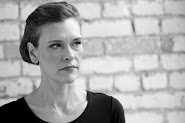
I changed my mind about what had taken place: I had failed improperly, not, as I had at first believed won every heart. I had not won every heart. I had failed to note it. The hearts were in the field.
The hearts, our hearts, our two tall hearts, our too-tall friendship, too tall for men, our hearts in our eyes, at a level, to the side, our hating to do this: to win, we lose. In shoot the moon, one must win the Queen of Spades and win every heart besides. The Queen of Spades is worth 13 hearts. I had lost the Queen of Spades.
I had not kept my eye on the prize: the prize is men’s eyes, eyes of surrogates, lechers, lepers, lawyers, leaders, landholders, landlubbers. The Queen of Spades had not won every heart, but it was not in her heart to realize it, and now: what difference did it make? She had reported her gain. Had she not won her own heart repeatedly, to her own self-satisfaction, had she not concealed it, not robbed? Didn’t she make sense to herself, wasn’t she pleased? Didn’t her publisher—name withheld—vie for her in the heart-sniffing world of connoisseurs? Didn’t the losers sign off at the end, due to a formal requirement that they admit defeat to her, the winner of hearts? Didn’t her hearts all fear her?
I was not yet beginning to fear her. I admired her, as I admired all good people. Her quip was a dagger that stabbed out of her mouth, insisting on the laughter of the people around her. Incest, she laughed first, to a famous poet about a famous poet, whose biographer vied to be yet more famous.Did her face require so much studious fascination? I had looked at the side of her face more ways than one—the sort of face she wore but also the sort of face her parents, who were God to her, had given her, her ancient bone structure, her judge’s eyes, her smile like the Mona Lisa’s. No man would add a mustache to that face. I had not “bested” her. I was not best. I was better and “sincerely.” It was for men that we had slowly abandoned our happy female natures, in favor of our female utility. There were men who had not seen her naked (in the flesh) but who had wanted to: She looked better naked, men said, following counsel; she had a little widow’s paunch. She went giddy turning down hearts of five men and breaking open the marriage of a sixth. Later, she bore two children and took another from its mother; in that year of winning hearts (all the hearts, she still firmly believed, her looks like a dragon’s), she bore herself like a “widow.” Men edged up to that spot, to that kinetic circle with one woman inside, the men on the skirts of her central position, wanting to touch him: her father, wanting to meet him, to know him, to pass his tests, to be put to the test for his riches, but they’d already had her, and the father, not hearing all of this ridiculousness, girl-to-woman, woman-to-man, serenely born, knew she was not a widow! The hearts-winning the mystery, in that year of her life.
She had not won every heart, though she had won the Queen of Spades, and I had failed to win her: Ace, 2, 3, 4, 5, 6, 7, 8, 9, 10, Jack, Queen, King. I had lost, sorely, had failed like no other: no diary could tell it! She flew pyramidically to the bank, in generous forms of self-appreciation, nodding to buyers that she had “shot the moon,” that the anonymous missing other person had failed miserably while trying to shoot the moon, a quip, a dagger, her laughter lunging ahead of theirs, required. Neither of us thought of real winning. We set about brilliant losing, dark angel forms of luck and greed, the desire, the craving, the need to lose so strenuous, in fact, that one wins, but we tied at 13. She was 26 when she faked her victory; I was 29 when I lost mine.
Under the covers, the dark bleeding iris melts its moon, its room, is first one iris then two, then a triple gold, a girl, a follower, a believer, a friend, just sniff her: she’s real, petals the scent of themselves, of each phrase. She is dowager, maiden, handmaid, kitten, coat rack, stamen, the height, the glory; the night she leaps toward and whispers to, the air, the pillow that buffets her crazy hair, without its claws, its courageous stare: it is and isn’t there, both dark and fair. The queen of hearts is worth one there.
 1. At Ana Verse select the Gabcast recording of Swedish folkpoems. Play the first song, "Rida, rida ranka."
1. At Ana Verse select the Gabcast recording of Swedish folkpoems. Play the first song, "Rida, rida ranka."














